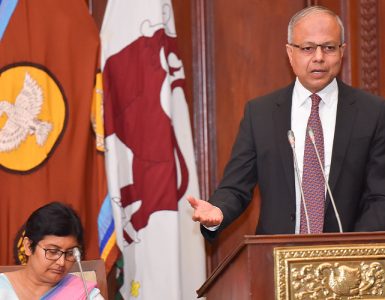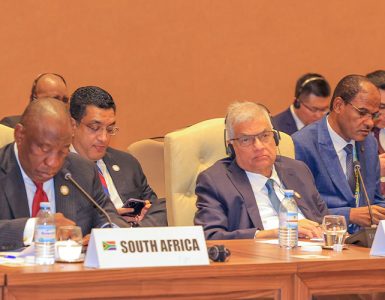Minister of Trade, Commerce and Food Security Nalin Fernando expressed optimism about the country’s economic prospects during a press conference held at the Presidential Media Center today (04).
He stated that with the government’s efforts to reduce economic contraction, there is a possibility of achieving a robust economic growth rate of 1.8% to 1.9% in 2024.
The minister highlighted that the government’s prudent policy decisions in the previous year have led to a significant economic recovery and brought inflation down to single digits. Speaking on the theme of ‘Collective Path to a stable country,’ Minister Nalin Fernando shared these positive developments.
Regarding ongoing negotiations with the International Monetary Fund (IMF), he mentioned, “We are currently in discussions for the second tranche of the IMF program. In our recent talks with the IMF, we focused on meeting the goals they set for us. Although there were some delays in generating state revenue, the government has diligently worked on it and implemented various policy decisions with effective leadership.”
Mr. Nalin Fernando emphasized the importance of taking necessary steps to reduce economic contraction and transition to a more prosperous economy in 2024. He noted, “According to current forecasts, achieving a financial economic growth rate of 1.8% to 1.9% in 2024 is possible. One of the key objectives of our economic policy program was to address the high cost of living for consumers.”
Furthermore, he highlighted their success in reducing food inflation from 94% to -5.1%, a development that some had doubted could occur so quickly. He attributed the country’s economic recovery to the government’s sound policies.
In addition, the minister pointed out that the reduction in bank interest rates, which had previously soared to 30%-32%, down to 15%-16%, has relieved significant pressure on entrepreneurs and traders, leading to improved economic efficiency in the country.
“One of the significant challenges we faced during the economic crisis was the prohibition of various imported goods, which caused disruptions in international trade. These restrictions not only posed difficulties for international trade but also created challenges for domestic manufacturers.
Our production isn’t solely for domestic consumption but also for export. When crucial raw materials couldn’t be imported due to restrictions, it hindered our production activities, impacting both national production and a decline in export earnings.
The topic of which imports to permit received significant attention in recent cabinet meetings. Consequently, we are presently taking measures to lift import restrictions on items other than vehicles. As for vehicle imports, decisions have been made to allow those necessary for public transport and production activities.
Efforts are also underway to ease restrictions on vehicle imports, with a keen focus on our policy framework. In light of the recent economic crisis, during which companies made substantial profits while the public suffered, the government is committed to making decisions that prevent such situations from recurring in the future.”





